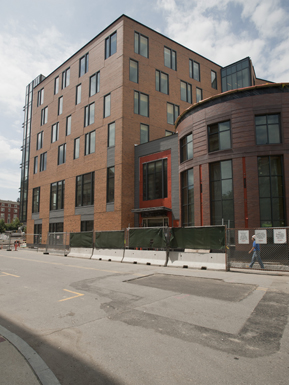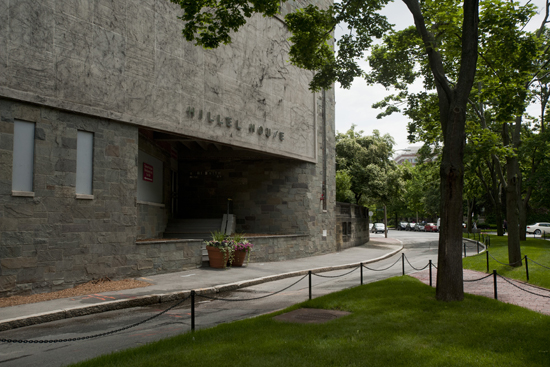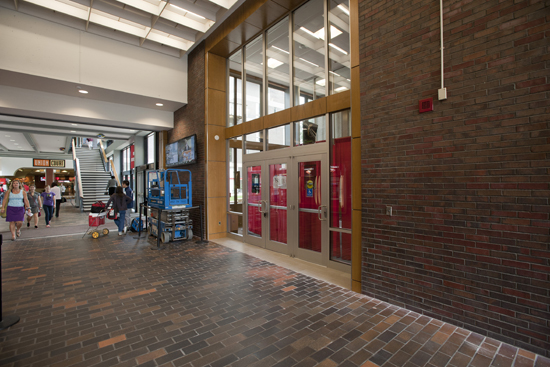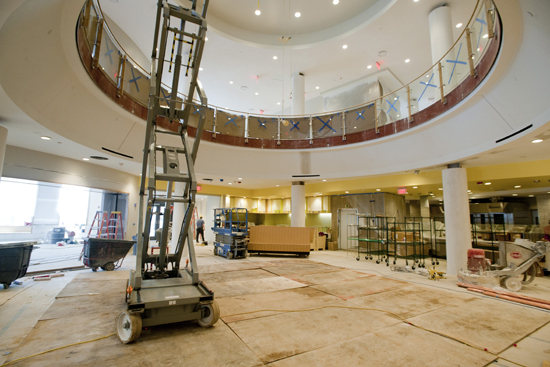University Invests $70 Million in Summer Construction
Center for Student Services one of several green projects

Susan Morgan is in the midst of a Herculean task. The senior project manager of the architectural firm Bruner/Cott Associates, Inc., has less than two weeks to ensure that all six floors of the new Center for Student Services at 100 Bay State Road have been painted, tiled, carpeted, and lit before its new occupants arrive in July and August—and there’s a lot left to do.
On a recent weekday, the din of nearly 300 workers fills the building as Morgan gives visitors a tour of the impressive space. Standing in the first floor’s oval-shaped lounge called “the Ellipse,” she points out the terrazzo flooring, the acoustic wood ceiling, and Venetian art plaster on the walls.
But there’s one feature Morgan isn’t terribly excited about. “There are a few sparrows living inside the building,” she says, and they have to move out before everyone else moves in. (One of the birds flies by later in the tour.) Add that to her to-do list.
The center is just one of the projects under way on the Charles River and Medical Campuses. The University will invest roughly $70 million in new construction, renovations, and technology upgrades this summer. Workers broke ground on many of the projects the day after Commencement and plan to wrap up most of them by mid-August, just in time for students’ return.
The Center for Student Services is the most highly anticipated project on Charles River Campus this summer. When finished, the building will be home to six academic advising programs, including the Educational Resource Center, the Center for Career Development, and several College of Arts & Sciences programs, as well as a new dining hall that can accommodate more than 1,000 students.
Dennis Carlberg, the University’s sustainability director, says the building will be 20 percent more energy efficient than most new construction and will feature cutting-edge, ecofriendly technology, including a green roof, an innovative cooling system that uses chilled beams instead of forced air, and a device used to extract water from composted food scraps to reduce weight and the cost of disposal. (BU pays per pound of trash or compost removed.) These and other green features, he says, should qualify the facility for Leadership in Energy and Environmental Design (LEED) certification.
Workers are also putting the finishing touches on the School of Medicine student residence, the first on the Medical Campus. Come August, the nine-story structure at 815 Albany St. will house up to 208 students in sleek two-bedroom suites, each with a bathroom, kitchenette, and living space. Carlberg says this building will also be up for LEED certification, considering its energy-efficient design, water-efficient fixtures, use of recycled content in building materials, and an irrigation system fed by captured rainwater.

Another notable construction program under way is New Balance Field, which will rise on the expansive block surrounded by Babcock, Gardner, Alcorn, and Ashford Streets and will be ready by next summer. On a recent weekday, workers could be seen relocating an eight-foot-wide underground storm sewer line, the heavy thud-thud sounds reverberating through Tom Daley’s office. “For those of us who are engineers, this is like a sideshow in real life,” says Daley, associate vice president of facilities management and planning.
An 80,000-square-foot building on the block will be demolished before workers begin the construction phase of the project next month. The open-air, synthetic turf field, configured for field hockey, lacrosse, and soccer, will sit atop an enclosed parking garage with 346 spaces—an even exchange, Daley says, with those in the former Babcock lot. An exterior parking area with at least a couple dozen spots, including space for buses, will also be added.
Across campus, work has begun on the former Hillel House at 233 Bay State Road to transform the building into the new Admissions Reception Center, slated for completion next spring. The job will include a complete exterior face-lift and the creation of a large reception area and 180-seat auditorium. Another 2,500 square feet of space will be added to improve circulation within the building, which will eventually connect to the Castle, BU’s Tudor revival mansion and function hall next door. The buildings will be completely accessible to the disabled. Carlberg says this project is also slated for LEED certification considering its use of recycled building materials, energy- and water-efficient design, and well-tuned heating and cooling systems.
Even the BU Beach is having some work done. Since June 4, the Massachusetts Water Resources Authority has fenced off the area and a section of Marsh Plaza for the purpose of cleaning 470 cubic yards of sediment from a pipe that travels under the plaza out to the Charles River. The state plans to complete work on the project by August 29, and all areas will be restored. “It will look just the same as it always has,” Daley assures.

What does not look the same is the GSU Link, where a new entrance to Mugar Memorial Library will soon be created. The old entrance will be closed within coming weeks during the planned addition and remodel of the School of Law, for which prep work is being completed this summer.
Rich Hall and the graduate student brownstone residence at 60 Bay State Road are undergoing complete renovations. Rich is the last West Campus dormitory to undergo the work, which includes replacing all three elevators and the fire alarm system, upgrading the first-floor common spaces, and installing new furniture, lighting, floors, and wall finishes in its 330 student rooms and four faculty suites. Meanwhile, 60 Bay State Road will be deleaded, and the building’s roof and windows will be replaced. Each of the 10 apartments will receive new kitchens and bathrooms as well.
The University will decrease its carbon footprint through a variety of other projects. By the end of 2013, it will have replaced more than 1,000 windows at Metropolitan College, the School of Theology, and the College of Arts & Sciences with more energy-efficient architectural replicas as part of a project that began in 2008. The heating and cooling systems at the School of Management and administrative offices at One Silber Way will receive tune-ups, which could save more than 3 million kilowatt hours of electricity and 85,000 mmBTUs of fuel annually. And several buildings across the Charles River Campus will be converted from oil to natural gas, a cheaper and cleaner-burning fuel.
BU Academy, the on-campus high school at One University Road, launched its first capital campaign (having raised $1.6 million so far) to fund the construction of a visual arts studio on its top floor this summer and a music studio and recording room next summer, all of which will be accessible by elevator through a new glass atrium entrance. “It’s time to bring the arts into the 21st century and have an arts floor that would be commensurate with what our teachers are doing,” says Head of School James Berkman.

At the same time all across campus, the office deck is being reshuffled. The BU and ROTC music programs will move their practice rooms and instrument storage into 300 Babcock St., Information Systems & Technology offices will be consolidated at 163-179 Amory St. And the College of Engineering’s instructional machine shops will be relocated to the former Guitar Center space at 750 Commonwealth Ave.
New lab, office, and research space is also under way for Translational Synthetic & Medicinal Chemistry at 712 Beacon St. and Biomedical Engineering at 36 Cummington St.
Finally, 30 classrooms campus-wide will receive audio and visual updates, including new projection equipment, presentation media equipment, and wired and wireless network access.
Back at the Center for Student Services, Morgan is wrestling with her latest challenge: the installation of a gigantic hand-blown glass chandelier to be suspended from the second-floor ceiling of the dining hall. Everything is on schedule, she says, and with luck she will soon have one more item crossed off that to-do list.
Comments & Discussion
Boston University moderates comments to facilitate an informed, substantive, civil conversation. Abusive, profane, self-promotional, misleading, incoherent or off-topic comments will be rejected. Moderators are staffed during regular business hours (EST) and can only accept comments written in English. Statistics or facts must include a citation or a link to the citation.